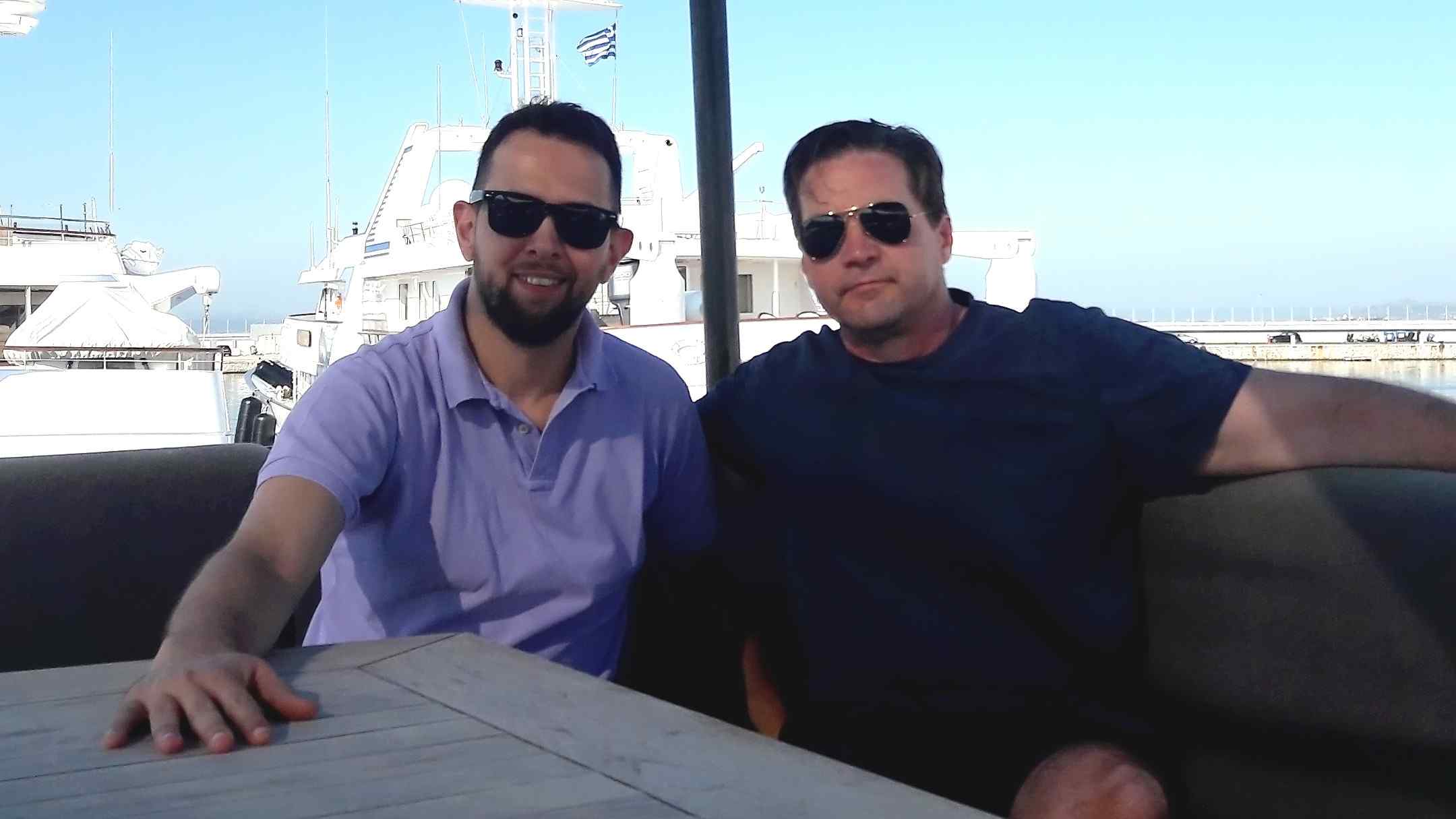
Exclusive Interview with nChain's Chief Scientist Craig Wright
Jul 19, 2018, 7:57AMIf you don’t have a disagreement then we have a bunch of idiots all sitting there agreeing blindly and getting nowhere. Presenting: Craig Wright
*The original audio file can be found at the end of this article.
I had the pleasure of meeting Craig Wright last Thursday at the beautiful Floisvos Marina in Athens, catching him on the tail end of his vacation in Greece. You probably know him from when he first sent waves of controversy through the crypto community for claiming the title of Bitcoin creator back in 2015. He has since made a name for himself as the chief scientist at nChain Limited and as one of the strongest evangelists for Bitcoin Cash.
This exclusive interview took place just days after nChain was awarded three new patents for Digital Rights Management Using Blockchain by the European Patent Office. It only made sense, then, to include some piercing questions about nChain and its strategic partnerships. But Craig, as you may have guessed, certainly did not need my help raising controversial issues, discussing everything from Bitcoin Cash and its scaling future to shamelessly commenting on Vitalik Buterin’s latest claims, in which the latter criticized nChain's recent win of a patent for a digital security invention.
You recently mentioned on Twitter we could see a 1TB block size in the future. What does the future for Bitcoin Cash scaling look like and could we expect such a block size increase?
Definitely. A terabyte is just the first, but there should be unbounded. This doesn’t mean that every single block is going to be full, it means "use." Also, if we didn’t have a limit now, it would still be economically bounded, by what miners can afford to put in. Miners and businesses are all that matter for this.
Bitcoin was never about home users running nodes, it’s about peer-to-peer cash. Not peer-to-peer people at home running settlement systems. My grandmother doesn’t care about settling her own money. She cares mostly about spending her money. And having a ledger that other people fight and compete for, to keep secure, matters. Now, this is why Bitcoin is the way it is. It means that rather than this loose mesh idea that people seem to think would work, like the internet, Bitcoin is more modeled after things like the IRC (Internet Relay Chat) networks. It’s biomimicry. It’s the idea of a small world network, something like Newman and Strogatz and whatever else did. Very new concept, it’s only 20 years old or so, and in network theory, this means that, basically, we need a complete graph that is highly, densely connected.
And that’s what miners want because Bitcoin is not about finding blocks–that’s the error people have–it is about making sure that people know that you found the block. There’s no good as a miner finding a block; this is why things like “selfish mining”, and whatever else, are all bullshit. It doesn’t matter that I found a block, it matters that you know I found a block.
this is why things like “selfish mining”, and whatever else, are all bullshit. It doesn’t matter that I found a block, it matters that you know I found a block.
So today, would you still stick to your claims regarding the "Fallacy of selfish mining” in Bitcoin?
Oh totally. It’s a load of crap.
There is a reason why, instead of selfish mining, you’ve seen this Shitcoin Gold and all that, have been attacked by 51% attacks. If it was cheaper, the people would attack using “selfish mining.” They don’t; people have tried it, it fails. It is thinking that the network is a mesh, it’s not, it is a small network.
And now, this idea of gamma. Well, when I say negative gamma, it’s a probability, there is actually negative probabilities. You don’t get to them to a Master’s level and things like that, but that’s like many things. You get taught that you can’t do the square root of -1 until you get up to university and then they suddenly say, “We’ve been lying to you, you can”.
It’s the same sort of thing. As a miner, and if you are a miner, I send my packets directly to you and not waiting [for] all the other miners, I send to every other miner that I know of. Now this idea that you stick a whole lot of little sibyls out there that have many [inaudible]. What that means is that I send to you and then they get it, and then they send it to the selfish miner who now responds to us, and we go fuck off.
What that means is that I send to you and then they get it, and then they send it to the selfish miner who now responds to us, and we go fuck off.
So, it’s a misunderstanding of the network structure of Bitcoin, it’s not like the Internet, it’s not a mesh. It’s completely, utterly different than the Internet. Far faster, far more efficient, far more secure.
After the recent hard fork on Bitcoin Cash we expected a price increase, which hasn't come yet, as it was dragged down because of the correlation with BTC.
That’s because it’s all gambling. What we are building in partnership with companies in a variety of areas, like SBI and others, is “use.” We want to see people integrated with banks. Integrated with payment card systems. This is why that’s the strategy we’ve been having, not only for our own developments in-house but with acquisitions.
So nChain has purchased a stake or full control of a number of organizations; some of our own investments include HandCash, they include a number of others along those sort of lines, [inaudible] etc., which gives us a simple social wallet that I’ve been talking about for a long time. And frankly, this is something I can’t do to save myself so I won’t even try. It gives us a simple payment system, plus, all of that years ago back in 2013, I bought source code for poor banking systems. We have things like airmail modules and CTR tracking modules and I am hoping that will come out.
Forget this anarchist crap; it’s never going to work.
Forget this anarchist crap; it’s never going to work. If we want this to work we have to actually work within the system and give something that is not too threatening to governments, allows governments to, sort of, be bounded and let us grow our freedom at the same time. You can’t just throw the baby and the bathwater out together. What you’ve got to do is try and build. Too many people think that destruction is how you actually create things; it’s not. So, you’ve got to take what’s already there and build upon it. And Bitcoin allows that; that’s what people don’t get.
Too many people think that destruction is how you actually create things; it’s not. So, you’ve got to take what’s already there and build upon it. And Bitcoin allows that; that’s what people don’t get.
It allows you to integrate with banks. But still, then control some of the problems of central banks, who just print the fuck out of money.
Which cryptocurrencies do you see prevailing in the next decade?
Bitcoin Cash.
Besides BCH?
None. I don't. They’ve got no purpose. At least Ethereum tried for a purpose, but all that has become is shitcoin promotion. They gave up on what it was really about, (I could tell them how to fix things but I am not going to), but the concept at the moment won’t scale.
What’s next for Bitcoin Cash?
A lot of things. We are starting to integrate with the banking system, we’ve been talking about a whole lot of security and privacy systems, but first, simple payment systems. Ones that will allow my grandmother to use better token systems. When we bring out tokens on Bitcoin Cash later this year, I don’t want to see ICOs. It will be feasible, whatever else, to do it, but I want to see regulated securities.
What people don’t get is, this concept of companies are bad and whatever else, we have to do it without control. It’s a load of crap. People don’t understand that it was hundreds of years fighting government to get the right to have limited liability. That’s actually a win.
Some of these idiots, “idiots” is not a strong enough word, but idiots who call themselves anarchists are not understanding. This is something that we won from government and these assholes are throwing it away. Limited liability replaced strict partnerships where if one person did something wrong, the other partner was completely liable including jailing for debtor's court and things like that. Limited liability in companies allows people to form structures and companies and manage risk without being thrown into jail for debt. It allowed them to build organizations that outlast them.
What would you say that made Gavin Andersen shift to your side back in 2016?
Hmm. Gavin's sane? He cares about Bitcoin, he wants to see it grow and he is sick of the idiots who want to try and destroy everything. He wants to see a world where his kids will live that isn’t in conflict and fighting, and that’s the thing people don’t get. Anarchy always ends in conflict, death, violence.
He wants to see a world where his kids will live that isn’t in conflict and fighting, and that’s the thing people don’t get. Anarchy always ends in conflict, death, violence.
Every time it’s been tried, there are actually thousands of documented cases, of people trying to make anarchist societies. And zero of those have even - even if you go to something as stupid as Wiki - you find hundreds of documented [inaudible]. Research is pointing out more. And not one of those ever ended without violence. Some without murder, but not all.
You mentioned in an interview once that it is the economics of the system that makes it strong, not the algorithms. Could you elaborate?
Really, it's about putting effort into, basically, finding blocks faster than anyone else. That isn’t, thus, the algorithm itself. I mean it doesn’t matter which hashing algorithm or which anything else. It’s proving that you have done an amount of computational effort. So, the algorithm doesn’t make that strong. The amount of money you are investing and putting into creating systems, that makes it strong. It doesn’t matter if it’s even a hash algorithm or something like this. No extra strength from that.
Reading your tweets over the last few days, you mentioned that you are working on some papers. Would you like to share some insights about them?
Not yet, because we want to protect our IP (intellectual property) I really feel that having a whole of shitcoins, trying to use some of it and having to fight with them for these things, but I figure people might start to understand what I’ve got in five years from now.
I figure people might start to understand what I’ve got in five years from now.
That’s the current papers. Even the ones that I am just starting; we've just had another three patents awarded yesterday, so from pending to full award, now we have five and each week we expect more now. Even those it will take a while. We’ve got some companies, Atlantis Labs over in the US who’ve been [inaudible] to build secure applications, secure messaging, distributed oracles.
What can you tell us about what’s happening at nChain or what particularly excites you about what’s in development there?
We are a strange organization, we don’t really want to be someone like Google or whatever else, I have enough headaches or whatever else, with things already. We work with a lot of external companies, we are in discussions with some companies in China about a partnership for development, we have partnered with a company in Eastern Europe called Crea, we have developers, we don’t want to build a huge internal development team. What we try and do is we have the leadership function, so we have researchers, we have mathematicians, computer scientists, and architects who can develop and design code and then allow others to build it. We are now branching out a little bit, we're setting up a professional services arm because we need to start educating companies.
Coindesk reported a couple months ago that nChain is intended to replace Bitcoin Core. To what extent is that a valid claim about the intention behind the project?
That’s a lot of crap. Coindesk is just paid shill media. I'll wipe my ass with better bloody journalism than I've seen out of them.
That’s a lot of crap. Coindesk is just paid shill media. I'll wipe my ass with better bloody journalism than I've seen out of them.
What do you think is behind the objections by Vitalik Buterin and others regarding the legitimacy of nChain’s patents?
One, Vitalik wouldn’t know how to read a patent if it came up and bit him. He is a kid and that’s about as much as I can say.
One, Vitalik wouldn’t know how to read a patent if it came up and bit him. He is a kid and that’s about as much as I can say.
If he’d actually spent some more time and didn’t drop out of university and finished something, then he might actually understand how these things work. The first part of a patent is “prior art.” So, these things go through and they are examined and it takes years, and people can oppose them and they could have opposed at any time. I mean, they jumped up and down when they first got published and said, oh, fight these and examined all that and they looked and went, “This is all bullshit.” So basically, the first section of a patent is prior art. And you read the prior art, and because it's like if you write a thesis, you have a lit review and in your literature review you put all the things that have gone before. So, the patent offices, that allows them to actually understand what you’ve used to build things.
Then you take all these bits and you say, “We have a new engine – we have used the combustion engine, but this is how we've improved it.” So what people don’t get is, you are then explaining based on all this that came before, and now this is what we’ve done. But then, if Vitalik and others had actually completed their degrees and written a thesis, they might actually understand how this little process works. So, when you write a thesis, you say, all these guys I am standing on their shoulders because they have done all this great work. But we take what they’ve done and we do this and make something even better.
So, you say that his claims are based on ignorance and not on some hidden agenda, let's say?
Yes, I think it’s ignorance. I just think Vitalik is a silly boy.
I just think Vitalik is a silly boy.
I can understand why he is upset and threatened, he’s got his little Vitalik foundation there and if we succeed it all comes crashing down. The difference is that we can scale and Ethereum can’t.
In general, what is your sense of the state of debate among key figures in the crypto community? Would you say it’s just healthy debate? Is it a problem with Twitter? Why is there so much disagreement among the different camps?
There should be disagreement; it’s competition. If you don’t have a disagreement, then we have a bunch of idiots all sitting there agreeing blindly and getting nowhere.

Disclaimer: information contained herein is provided without considering your personal circumstances, therefore should not be construed as financial advice, investment recommendation or an offer of, or solicitation for, any transactions in cryptocurrencies.


















